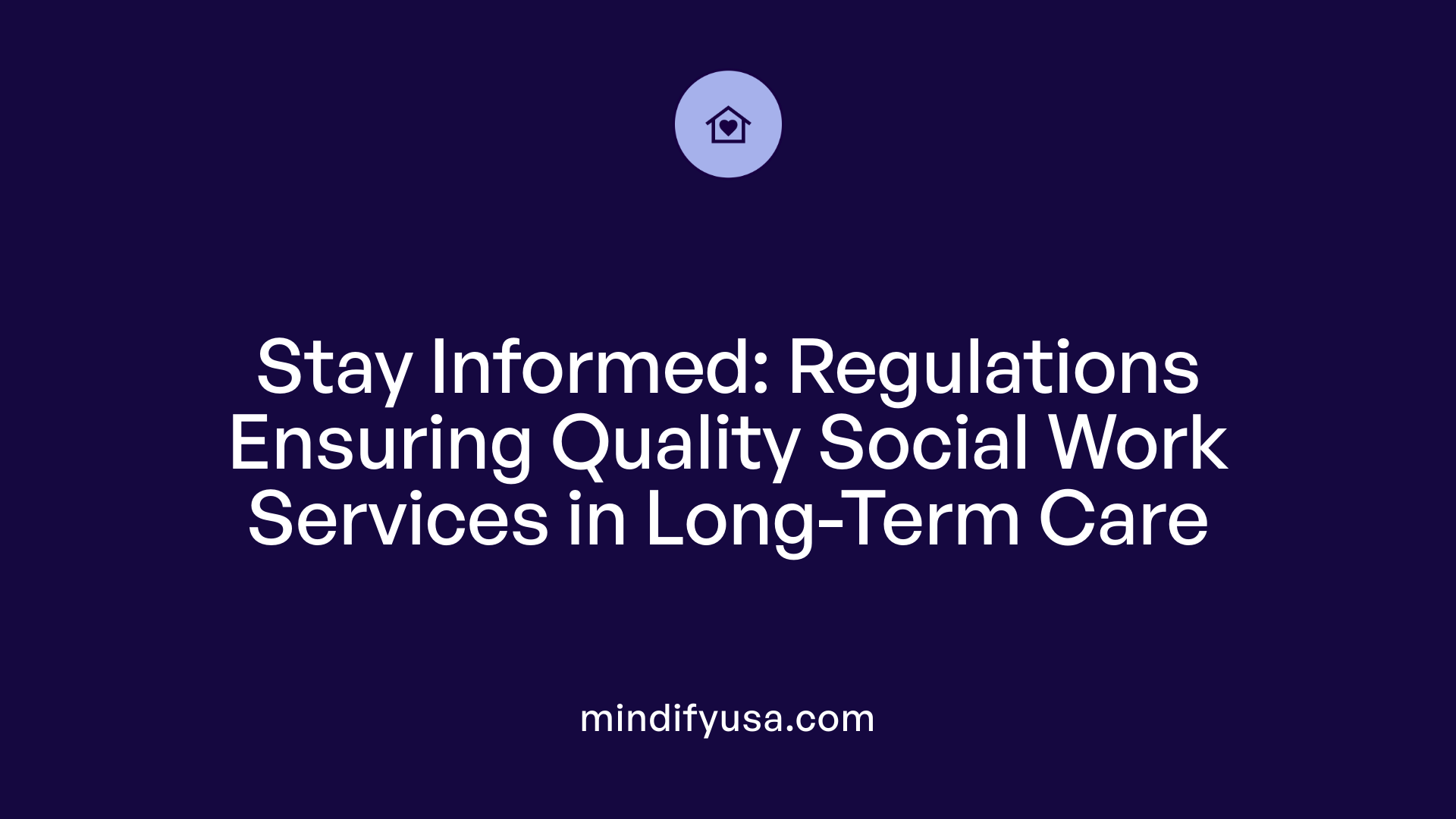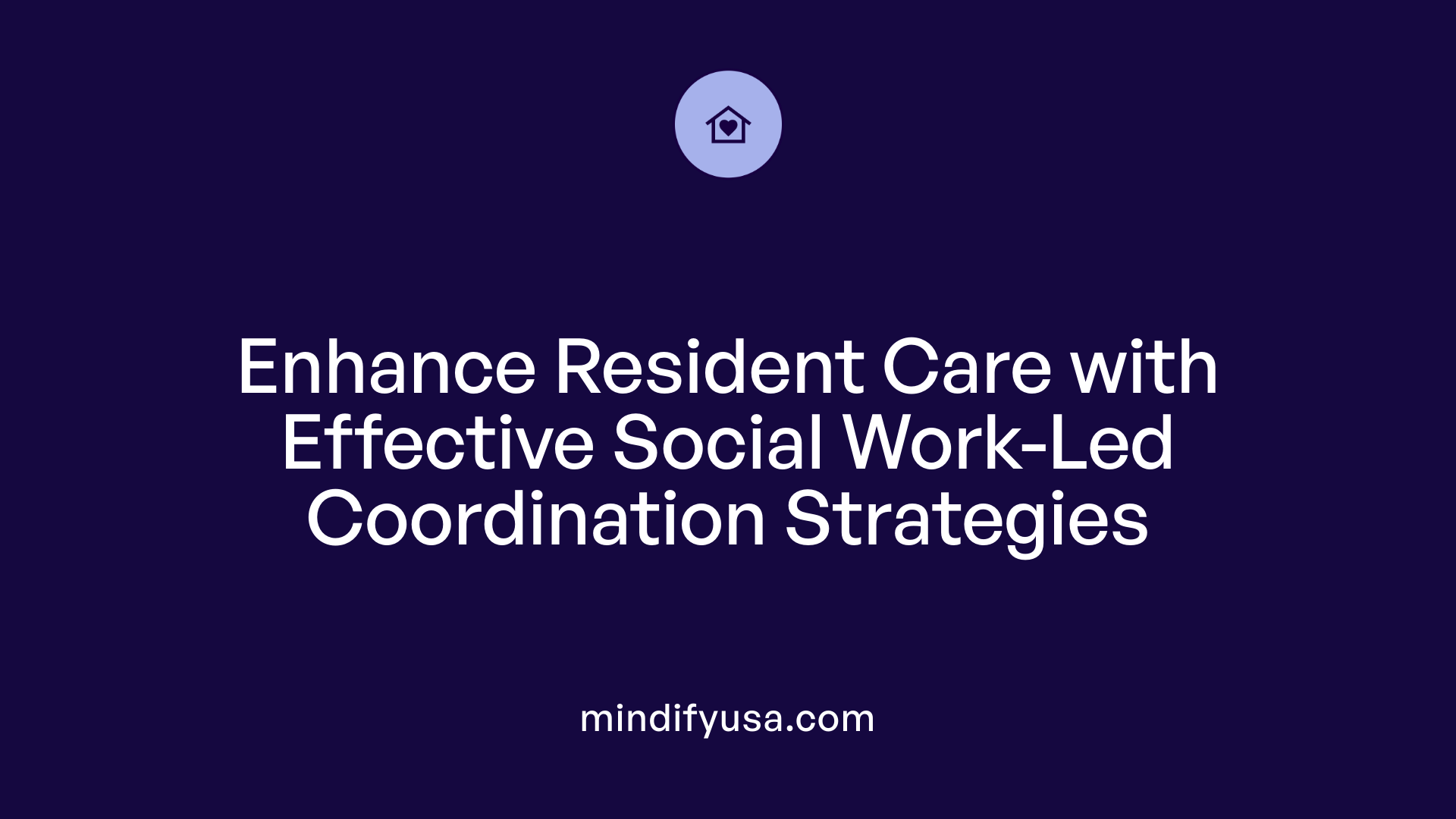The Critical Role of Social Workers in Long-Term Care
In long-term care settings such as nursing homes, effective care coordination is essential to ensuring residents' health, safety, and quality of life. Central to this process are social workers, who serve as vital links among residents, families, and interdisciplinary teams. This article explores the responsibilities, best practices, legal standards, qualifications, and collaborative strategies that underpin effective care coordination with nursing home social workers, emphasizing their indispensable role in promoting holistic, person-centered care.
Understanding the Role of Nursing Home Social Workers

What is the role of a social worker in a nursing home?
A social worker in a nursing home serves as a dedicated advocate and supporter for residents, focusing on their emotional, social, and psychological well-being. They help residents adjust to their new living environment by providing support that addresses feelings of loneliness, grief, anxiety, and depression. Part of their work involves conducting assessments to identify each resident's unique needs and developing personalized care plans to meet those needs.
Furthermore, nursing home social workers act as a bridge among residents, their families, and healthcare staff. They coordinate care by facilitating communication and ensuring that residents’ preferences and rights are respected. They also assist with the transition processes, such as admission and discharge, making these periods as smooth as possible. Their advocacy extends to ensuring residents are aware of their rights and receive respectful, ethical treatment. They are instrumental in end-of-life planning, including discussions related to palliative and hospice care, and understanding legal regulations around funerals and burials.
Overall, social workers aim to enhance residents’ quality of life through emotional support, empowerment, and community engagement, fostering a sense of belonging in the long-term care environment.
What are the responsibilities of nursing home social workers?
Nursing home social workers carry out a broad spectrum of responsibilities designed to promote residents’ holistic well-being. Their core duties include assessing residents’ mental, emotional, and social health by conducting psychosocial evaluations. Based on these assessments, they develop individualized care plans tailored to each resident’s needs and preferences.
They serve as advocates, ensuring residents’ rights are protected and that they receive appropriate services within the facility and from external resources. This involves coordinating with healthcare providers, arranging for therapies, mental health counseling, and community-based services like transportation, food assistance, and financial support.
An essential part of their work includes participating in interdisciplinary team meetings to review care plans, update progress, and adjust interventions accordingly. They also facilitate communication with families, mediating conflicts and providing emotional support during difficult times.
Additionally, social workers play a crucial role in supporting care transitions, such as hospital discharges, and ensuring compliance with federal and state regulations governing resident care. They are trained to handle crises, respond to allegations of abuse or neglect, and advocate for residents’ dignity and safety.
Through counseling and support groups, social workers help residents cope with loss, manage behavioral health challenges, and maintain a sense of purpose and social connection. Their contributions not only improve residents’ mental health but also foster a supportive, respectful environment that upholds ethical standards and enhances quality of life.
How do social workers support residents' emotional and social needs?
A primary focus of nursing home social workers is addressing the emotional and social needs of residents. They provide supportive counseling to help residents manage feelings of loneliness, anxiety, and depression common in long-term care settings. These sessions help residents process their experiences, cope with changes, and develop resilience.
Social workers organize and facilitate support groups, creating opportunities for residents to share their stories and build community. Such activities promote social engagement, reduce feelings of isolation, and contribute to mental health stability.
They also foster opportunities for residents to participate in recreational activities and social events, which are vital for emotional well-being and social connection. Additionally, social workers assist residents in maintaining relationships with loved ones, offering guidance and support to families navigating complex caregiving challenges.
By considering both personal histories and environmental factors, social workers implement trauma-informed and strengths-based approaches. They help residents find meaningful activities, develop new interests, and connect with community resources that enhance their overall quality of life.
How do social workers ensure residents' rights and advocate for their needs?
Advocacy is a cornerstone of a social worker’s role in nursing homes. They serve as champions for residents’ rights, ensuring they receive care that respects their dignity and autonomy. This includes representing residents during care planning meetings and mediating conflicts between residents, families, and staff.
Social workers also identify and address communication barriers, cognitive impairments, or physical limitations that may hinder residents’ ability to express their needs. They work to ensure accommodations are in place so residents can participate actively in their care decisions.
Part of their responsibility involves ensuring compliance with federal and state regulations related to elder rights, abuse prevention, and ethical treatment. They investigate complaints, handle crises involving neglect or mistreatment, and coordinate interventions needed to protect residents.
By facilitating transparent communication and fostering a culture of respect and empowerment, social workers help residents maintain control over their lives, thereby reinforcing their dignity and rights.
How do social workers support during transitions and end-of-life?
Transitions, such as admission to or discharge from the nursing home, are critical moments that require sensitive handling. Social workers assist residents and families in navigating these changes, providing counseling and practical support to ease anxiety and confusion.
They coordinate services needed during transitions, including arranging transportation, explaining care options, and ensuring smooth referrals to community resources or home health services.
At the end of life, social workers play a vital role in advanced care planning. They facilitate discussions about residents’ preferences for palliative care, hospice services, and funeral arrangements, ensuring these choices align with residents’ wishes.
Providing emotional support during these moments is essential, helping residents and families cope with grief, anxiety, and loss. They also support staff and families in understanding and honoring residents’ final wishes while complying with legal and ethical standards.
Through compassionate intervention, education, and coordination, social workers ensure that transitions and end-of-life stages are handled with dignity and respect, ultimately enriching the residents’ quality of life during their remaining days.
Legal and Regulatory Standards Governing Social Work in Nursing Homes

Are nursing homes required to have social workers?
Regulations do not mandate the employment of professional social workers in all nursing homes. However, federal guidelines by the Centers for Medicare & Medicaid Services (CMS) specify that facilities with more than 120 beds are required to employ at least one full-time social worker. It is important to note that this role does not necessarily have to be filled by someone with a formal social work degree. This regulation aims to ensure that larger nursing homes provide adequate psychosocial support and resident advocacy services.
What are the requirements and qualifications for nursing home social workers?
To serve as a social worker in a nursing home, individuals are generally expected to hold at least a bachelor's degree in social work or a related human services discipline from an accredited educational program. For larger facilities exceeding 120 beds, the law explicitly requires the employment of a qualified, full-time social worker who must possess a bachelor's degree and demonstrate at least one year of supervised experience within a healthcare setting.
The role of the social work director is often filled by a professional holding a master's degree in social work (MSW) and additional postgraduate experience, ensuring higher-level oversight and expertise. While some smaller nursing homes are not legally required to have an on-site social worker, they must ensure that residents' social needs are adequately addressed, whether through external providers or comprehensive planning.
Furthermore, social workers in nursing homes need to meet state-specific licensure or credentialing standards. Many states recognize credentialing through the National Association of Social Workers (NASW) or similar professional bodies. Some states participate in the Social Work Interstate Compact, allowing licensed social workers to practice across state lines, increasing workforce flexibility.
The responsibilities of social workers typically include conducting psychosocial assessments, developing individualized care plans, advocating for residents’ rights, coordinating various support services, and ensuring appropriate mental health and behavioral care. These roles are critical for maintaining residents' emotional well-being and quality of life.
What standards and guidelines govern social work in nursing homes?
Social work practice within nursing homes is governed by various federal and professional standards. The primary federal regulation, outlined in 42 CFR Part 483, sets comprehensive standards for resident rights, quality of care, staffing requirements, and facility environment.
Facilities are mandated to develop and implement written service plans that address each resident’s physical, emotional, and social needs. These plans are guided by standards set forth by the NASW, which emphasize the importance of culturally competent, person-centered care. The social work department must be adequately staffed with qualified professionals, and their activities should include assessment, care planning, discharge planning, advocacy, and resident education.
Documentation and record-keeping are crucial parts of compliance, with all social work interventions documented within residents' medical records. On an ongoing basis, social workers are expected to participate in interdisciplinary team meetings to promote holistic, coordinated care. They must also engage in ongoing professional development to sustain competence and adhere to ethical standards.
In summary, social workers in nursing homes operate within a strong regulatory framework that emphasizes resident rights, quality care, and professional accountability. These standards help ensure that residents receive comprehensive support to enhance their quality of life, dignity, and independence in long-term care settings.
Care Coordination and the Role of Social Workers in Long-Term Care

What is a care coordinator in a nursing home?
A care coordinator in a nursing home is a healthcare professional tasked with managing and organizing each resident’s care plan. They serve as the central point of contact, ensuring that all aspects of the resident’s treatment and support are aligned and personalized.
Care coordinators work closely with healthcare providers such as nurses, physicians, and social workers, along with residents and their families. Their responsibilities include monitoring residents' health progress, educating families about medical conditions, advocating for residents’ needs, and ensuring compliance with healthcare regulations and privacy laws.
In nursing homes, care coordinators often collaborate with staff to ensure smooth transitions in care, whether during admission, discharge, or ongoing treatment adjustments. They play an essential role in enhancing residents' quality of life by delivering organized, responsive, and individualized care.
How can care be coordinated effectively with social workers in nursing homes?
Effective care coordination with social workers in nursing homes hinges on consistent communication and collaboration among the entire care team. This team includes healthcare providers, residents, families, and external agencies.
Social workers contribute significantly by developing and implementing care plans that address the physical, emotional, and social needs of residents. They act as advocates, mediators, and connectors—helping residents access mental health services, transportation, social activities, and financial resources.
Regular participation of social workers in care plan meetings ensures that residents' needs are continually reassessed and adjusted. They facilitate open dialogue about residents’ preferences and concerns, helping to resolve conflicts and foster mutual understanding among residents, families, and staff.
By leveraging their expertise in psychosocial support and resource linkage, social workers strengthen interdisciplinary teamwork. This collaborative effort ensures that care remains comprehensive, person-centered, and adaptable to changing health conditions.
Care planning and team collaboration
In long-term care, care planning involves a meticulous process of assessing each resident’s complex needs through comprehensive evaluations. This assessment considers medical, emotional, social, and functional aspects.
Once the needs are identified, the interdisciplinary team—including social workers, nurses, physicians, therapists, and other specialists—drafts a tailored care plan. This plan outlines specific goals, interventions, and services required to support the resident’s health and well-being.
Team collaboration is vital to ensure everyone is working towards common objectives, sharing information regularly, and respecting residents’ preferences and rights.
Residents’ comprehensive needs assessment
Assessing a resident’s needs comprehensively involves detailed evaluations of physical health, mental health, social circumstances, and environmental factors. Social workers often lead the psychosocial assessments to understand emotional well-being, social connections, and potential barriers to care.
This thorough assessment helps identify issues such as loneliness, depression, or cognitive decline. It also reveals social determinants that impact health, such as housing stability, financial status, and access to community resources.
Based on these insights, care teams can design individualized interventions that promote dignity, independence, and quality of life.
Monitoring and reviewing care plans
Effective care coordination includes ongoing monitoring and periodic review of care plans. Social workers and other team members track residents’ progress, evaluate the effectiveness of interventions, and make adjustments as needed.
This dynamic process ensures that care remains aligned with residents’ evolving needs and preferences. It involves regular documentation, feedback from residents and families, and revisiting goals during care meetings.
Monitoring also helps catch potential problems early, such as behavioral issues or health declines, enabling timely interventions and reducing hospitalizations.
Use of interdisciplinary teams
Interdisciplinary teams form the backbone of high-quality long-term care. These teams bring together diverse professionals—nurses, doctors, social workers, therapists, and activity coordinators—to collaborate effectively.
Each member contributes unique expertise, fostering holistic resident care. Social workers, in particular, excel in addressing psychosocial factors, expanding the team’s capacity to improve mental health, emotional stability, and social connections.
Interdisciplinary collaboration requires clear communication, shared goals, and mutual respect. Regular team meetings, integrated care planning tools, and electronic health records enhance coordination.
Such integrative efforts can lead to better health outcomes, higher resident satisfaction, and optimized use of resources.
| Aspect | Description | Role of Social Workers |
|---|---|---|
| Care Planning | Developing a personalized, comprehensive care approach | Lead psychosocial assessments, advocate for resident preferences |
| Residents’ Needs Assessment | Evaluating physical, emotional, and social needs | Conduct psychosocial assessments, identify barriers, suggest interventions |
| Monitoring & Review | Regularly tracking progress and updating plans | Coordinate reviews, adjust care strategies, involve residents and families |
| Interdisciplinary Teams | Collaborative groups for holistic care | Facilitate communication, offer psychosocial support, resource linkage |
Summing up
Care coordination in nursing homes is a complex but vital process that ensures residents receive respectful, effective, and personalized care. Social workers are central to this effort, acting as advocates, mediators, and resource connectors.
By fostering team collaboration, conducting comprehensive assessments, and maintaining ongoing oversight, social workers help create a supportive environment that promotes dignity, independence, and improved health outcomes for nursing home residents.
Understanding and implementing effective care coordination strategies with social workers can significantly enhance the quality and responsiveness of long-term care services.
Best Practices for Collaborative Care in Nursing Homes

What are the best practices for collaborating with nursing home social workers?
Effective collaboration with nursing home social workers hinges on understanding their vital roles within the interdisciplinary care team. Clear role clarification helps prevent overlaps and gaps in care, promoting a smooth workflow. Building mutual trust and maintaining open, respectful communication are crucial for sharing sensitive information and jointly addressing residents' needs.
Shared goals, like enhancing residents’ quality of life and facilitating smooth transitions, serve as a foundation for teamwork. Engaging in regular information exchange, especially through joint care planning sessions, fosters problem-solving and coordinated action. Embracing a team-based approach that values each member’s input leads to more comprehensive solutions.
Continuous learning about the psychosocial aspects of elderly care and developing cultural competence create a collaborative environment that respects residents’ backgrounds and preferences. Ultimately, fostering a culture of openness, mutual respect, and shared purpose enhances the delivery of holistic, resident-centered care.
What standards and guidelines govern social work in nursing homes?
The practice of social work within nursing homes is tightly regulated by federal policies, notably 42 CFR Part 483, which establish standards for resident rights, quality care, staffing, and facility environment. These regulations require facilities to develop written service plans that are aligned with the National Association of Social Workers (NASW) standards.
A qualified social worker — generally with at least a bachelor’s degree in social work or a related field and supervised experience — must be on staff, especially in larger facilities housing over 120 residents, where full-time social workers are mandated. The social worker’s core responsibilities encompass assessment, care planning, advocacy, discharge arrangements, and resident and family education.
Documentation of social work activities is essential and must be integrated into residents’ medical records, ensuring accountability and continuity of care. Furthermore, social workers are expected to pursue ongoing professional development, demonstrate cultural competence, and actively participate in interdisciplinary teams.
Compliance with these guidelines ensures that social work services promote residents’ dignity, rights, and well-being while aligning with legal and ethical standards of elder care.
How do these practices translate into improved resident outcomes?
Implementing collaborative, standards-driven practices ensures that residents receive personalized, respectful, and effective support. Clear role definition and open communication lead to timely interventions, reduced misunderstandings, and more seamless care transitions.
Shared information systems enable real-time updates on residents’ status, facilitating rapid responses to evolving needs and reducing risks like hospital readmissions or neglect.
Ongoing staff training enhances competencies in psychosocial support and cultural sensitivity, promoting empathetic and tailored interactions.
These combined efforts foster an environment where residents experience improved emotional well-being, better engagement in activities, and increased satisfaction with care. Overall, adherence to these best practices supports healthier, more dignified aging in nursing homes.
| Practice Area | Specific Strategies | Expected Outcomes |
|---|---|---|
| Interdisciplinary Team Collaboration | Regular team meetings, role clarification, shared goals | Cohesive care, better problem-solving, resident satisfaction |
| Role Clarity and Communication | Clear documentation, respectful feedback | Reduced errors, enhanced trust, consistent care |
| Joint Care Planning and Decision-Making | Resident involvement, collaborative goal setting | Improved personalized care, resident autonomy |
| Shared Information Systems | Electronic health records, real-time updates | Faster responses, fewer adverse events |
| Ongoing Staff Training | Cultural competence, psychosocial skills | Higher quality interpersonal interactions, better mental health support |
In summary, fostering a strong collaborative environment rooted in clear standards and practices directly benefits nursing home residents by delivering more comprehensive, respectful, and effective care.
Enhancing Resident Outcomes through Social Work-Led Care Strategies
How can care be coordinated effectively with social workers in nursing homes?
Effective care coordination in nursing homes relies heavily on the active involvement of social workers. These professionals serve as vital connectors among healthcare providers, residents, and families. Regular, open communication is essential, fostering an environment where all parties share information and coordinate efforts seamlessly.
Social workers assist in developing personalized care plans that consider physical, emotional, and social needs. They participate in interdisciplinary team meetings, ensuring that care strategies are comprehensive and resident-centered. Their advocacy role involves bridging gaps between residents' desires and the services provided, especially for those facing communication challenges or cognitive limitations.
Additionally, they facilitate access to community resources like mental health support, transportation, and financial aid, which are crucial for holistic care. Addressing psychosocial needs through ongoing support and counseling helps residents adapt to their environment. Overall, fostering collaboration, maintaining transparency, and utilizing the social worker’s expertise elevate the quality and coherence of care in long-term facilities.
What are the most significant benefits of involving social workers in resident care?
Including social workers in resident care significantly improves the overall well-being and satisfaction of residents. Their involvement addresses a broad spectrum of needs beyond medical care, focusing on mental health, emotional resilience, and social engagement.
Research shows that social workers help reduce hospital readmissions by planning effective discharge strategies and connecting residents with ongoing community support. They provide vital emotional support through individual counseling and facilitate support groups, helping residents cope with loneliness, anxiety, and depression.
Their advocacy efforts ensure residents' rights and preferences are respected, mediating family dynamics and resolving conflicts related to care decisions. Social workers also create opportunities for residents to participate in recreational activities and community events, promoting social interaction and a sense of belonging.
The holistic care approach advocated by social workers leads to improved mental health, increased satisfaction, and an overall higher quality of life. Their expertise ensures that care plans are comprehensive, compassionate, and tailored to individual needs.
Impact of social work on resident well-being
Social workers contribute meaningfully to residents’ mental, emotional, and social health outcomes. They utilize person-in-environment frameworks and strengths-based approaches to support residents facing various challenges, including chronic illness, mental health issues, and social isolation.
In long-term care settings, they conduct psychosocial assessments and develop interventions such as therapy, support groups, and meaningful activities. This helps residents adjust to their living environment, manage losses, and navigate complex emotional landscapes.
Their involvement fosters a sense of purpose and community, which is crucial for mental well-being. Additionally, social workers advocate for residents’ rights and coordinate services such as mental health counseling or legal assistance, thus ensuring comprehensive support.
Reducing hospital readmissions
A major benefit of integrating social work into resident care is the reduction of hospital readmissions. By meticulously planning discharges and linking residents with community and home-based support services, social workers ensure continuity of care.
They work closely with healthcare teams to address social determinants of health, like housing stability and transportation, which significantly impact health outcomes. For residents with complex health needs, social workers facilitate access to specialized services, reducing the likelihood of complications requiring hospitalization.
Periodic reassessment and ongoing communication with external providers contribute further to avoiding unnecessary hospital visits, saving costs, and improving residents’ health stability.
Supporting mental health and emotional resilience
Social workers play a crucial role in supporting residents’ mental health. Through counseling, support groups, and crisis intervention, they address issues like depression, anxiety, and adjustment difficulties.
Their empathetic approach helps residents process feelings related to loss, illness, or placement changes. Organizing therapeutic activities and social engagement initiatives also aids in building resilience and fostering community.
Training staff and families about mental health awareness enhances support networks for residents, further promoting emotional well-being.
Promoting social engagement and community connection
Encouraging social interaction is vital for combating loneliness among residents. Social workers organize recreational activities, group therapies, and social events tailored to residents’ interests.
Facilitating connections with external organizations and community resources extends the social environment beyond the facility, enriching residents’ lives.
Such engagement not only improves mental health but also enhances physical health and overall quality of life, creating a vibrant, supportive community within the nursing home setting.
| Aspect | Role of Social Workers | Outcome | Additional Notes |
|---|---|---|---|
| Care Coordination | Develop and implement personalized care plans; facilitate team communication | Improved care quality; fewer errors | Engage residents and families actively |
| Emotional Support | Counseling; support groups; crisis intervention | Reduced loneliness; better mental health | Tailored to individual needs |
| Advocacy | Protect residents’ rights; mediate family discussions | Resident empowerment | Bridge gaps between residents, families, and staff |
| Social Engagement | Organize activities; connect with community | Increased satisfaction and belonging | Foster stimulating environments |
| Discharge Planning | Coordinate services; ensure smooth transfers | Reduced readmissions | Critical for continuity of care |
By integrating social work more effectively into nursing home operations, care teams can dramatically improve the health, happiness, and overall quality of life for elderly residents. Their comprehensive, person-centered approach addresses not only medical needs but also the emotional and social factors that contribute to well-being.
Building a Compassionate, Coordinated Care Environment
The integration of skilled social workers within nursing home interdisciplinary teams is essential for delivering holistic, dignified, and effective care. By understanding regulatory standards, fostering best collaborative practices, and leveraging their expertise in psychosocial support, care planning, and resource linkage, healthcare providers can significantly improve residents' quality of life. Emphasizing ongoing staff education, system-wide communication, and resident-centered philosophy will further strengthen care delivery, making nursing homes not just places of residence but communities of well-being and support.
References
- [PDF] THE CRUCIAL ROLE OF SOCIAL WORKERS IN NURSING HOMES
- The Important Role of a Social Worker in Nursing Homes
- Care Coordination in Nursing Homes and Senior Living
- Working as a Social Worker in Long-Term Care (LTC) - LeaderStat
- Care Coordination Agencies Provider Enrollment - DHCS - CA.gov
- Medical Social Worker - Explore Healthcare Careers
- The Role of Social Workers in Interprofessional Primary Healthcare ...
- What does a Nursing Home Social Worker do? Career Overview ...
- Social Worker - Nursing Home Toolkit
- [PDF] The Role Of The Social Worker In The Long-Term Care Facility






































































































